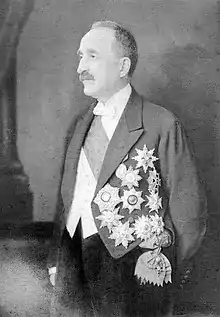Syreja Vlora
Syreja Vlora (1860–1940), usually referred to as Syrja Bey Vlora (Turkish: Avlonyalı Süreyya Bey[1]), was an Ottoman Albanian politician, an active figure of the Albanian Declaration of Independence in 1912[2] and one of the delegates of the Assembly of Vlorë.[3]
Syreja Vlora | |
|---|---|
 | |
| Born | 1860 |
| Died | 1940 (aged 79–80) |
| Occupation | Politician |
| Known for | Albanian Declaration of Independence |
Biography
Syrja Bey was born in Vlorë, back then Ottoman Empire, in 1860. He was a member of the distinguished wealthy landowning Vlora family, historically successful through the ranks of Ottoman administration and military for almost 4 centuries.[1] He was the brother of the Grand Vizier Avlonyalı Ferid Paşa (1851-1914)[1] and both were sons of Mustafa Pashë Vlora. Vlora was also related to Ismail Qemali, both being political rivals at the same time. He was married to the cousin of Essad Toptani.[4] During the late Ottoman period, Vlora served as economic advisor to sultan Abdul Hamid II.[1]
Before the creation of the new Albanian state, he also held the positions of General Director of the Customs of the Ottoman Empire, and was a representative in the Ottoman Parliament from 1908. Vlora thought that Albanians were not ready for independence and favored a future autonomous Albania becoming a protectorate under Austria-Hungary in the advent of collapse of the Ottoman Empire.[5] In 1911 Vlora wrote a chapter on Albanian history focusing on the Ottoman era and subjects like Skanderbeg and Ali Pasha of Yanina in an edited book titled Musaver Arnavud (The Illustrated Albanian) in Ottoman Turkish by Dervish Hima.[6]
In 1912 during the Albanian revolt and aftermath of the Ottoman parliamentary elections, Syrja Vlora parliamentarian for Berat and Essad Toptani for Durrës represented the Albanian side in a parliamentary discussion with the Young Turks.[7] Both called for the cessation of government force and implementation of good governance to alleviate the situation in Albanian lands.[7] After the Declaration of Independence of Albania during November 1912 in his home town, where he was a delegate for the Përmet region, he held minor political positions, known mainly as the Albanian Ambassador in Vienna in 1914.[4]
He was the father of the Albanian politician and scholar Ekrem Bey Vlora. Together they had negotiated for Albanian independence in Austria during the pre-independence European tour of Ismail Qemali.[8]
He died in 1940.
References
- Gawrych 2006, p. 23.
- "History of Albanian People" Albanian Academy of Science.ISBN 99927-1-623-1
- Michael Schmidt-Neke (16 November 1987), Entstehung und Ausbau der Königsdiktatur in Albanien (1912-1939): Regierungsbildungen, Herrschaftsweise und Machteliten in einem jungen Balkanstaat, Oldenbourg Wissenschaftsverlag, p. 320, ISBN 978-3486543216
- Syrja bej Vlora, rrëfehen kujtimet [Syrja Bey Vlora, the memories get narrated] (in Albanian), Gazeta Metropol, 2013, retrieved 2014-01-26
- Skendi, Stavro (1967). The Albanian national awakening. Princeton: Princeton University Press. p. 279. ISBN 9781400847761.
- Gawrych 2006, p. 184.
- Gawrych, George (2006). The Crescent and the Eagle: Ottoman rule, Islam and the Albanians, 1874–1913. London: IB Tauris. p. 193. ISBN 9781845112875.
- Veli Bej Këlcyra, firmëtari i panjohur i pavarësisë (in Albanian), Gazeta Tema, 2012-05-19, retrieved 2014-01-26,
Ai ishte i pari i Oxhakut të Vlorës, babai i Eqrem Bej Vlorës dhe kushëriri i Ismail bej Vlorës. Së bashku me të birin e tij, Eqrem bej Vlorën, ata kishin negociuar në Vjenë për pavarësinë e Shqipërisë me austro-hungarezët, ku më pas Syrja Bej Vlora shkoi si ambasador i Shqipërisë.[He was the first of the Vlora Oxhak (family), father of Ekrem Bey Vlora cousin of Ismail Qemali. Together with his son, Ekrem Bey Vlora, they had negotiated the Independence of Albania in Vienna, where he would be sent later as ambassador.]